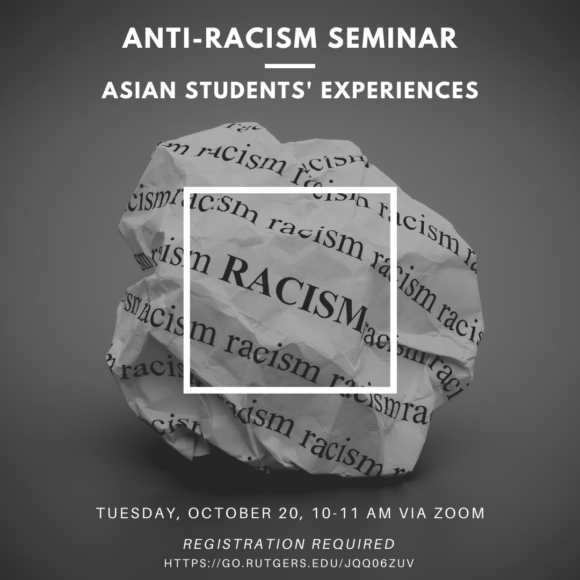 During the COVID19 lockdown, international Asian students who remained in the U.S. found the simple task of getting to the grocery store to be daunting. Feeling vulnerable to the virus on public transportation, when attempting to use Uber, they found the drivers refused them service. Further, the fear of interacting with locals kept many confined indoors. In a survey disseminated by the SEBS Office of International Programs in June, students reported not being able to access the items they needed and not knowing where to turn.
During the COVID19 lockdown, international Asian students who remained in the U.S. found the simple task of getting to the grocery store to be daunting. Feeling vulnerable to the virus on public transportation, when attempting to use Uber, they found the drivers refused them service. Further, the fear of interacting with locals kept many confined indoors. In a survey disseminated by the SEBS Office of International Programs in June, students reported not being able to access the items they needed and not knowing where to turn.
The United States is in the midst of multiple complex crises; the combined forces of a global pandemic and racial injustices have ignited the country on the world stage. Institutions across the U.S. have responded with messages of support and calls for stability. Within the confines of our own community, we have felt the sting of COVID19 while also working to address the systemic inequalities that have been laid bare in these tenuous times.
In an effort to support the student community through these joint crises the SEBS Office of International Programs (OIP) will host the “Anti-Racism Seminar: Asian Students’ Experiences.” The motivation for hosting the seminar is to address the concerns voiced by the international Asian student community after the June survey highlighted the fear and racism they were facing during the early COVID19 pandemic. “It was at this time we recognized our own lack of readily available resources outside of CAPS services, the diversity centers and the bias incident reporting system which were not always equipped to singularly respond to the concerns highlighted by the COVID19 pandemic,” said Hyunjin Yeo, program coordinator, OIP.
While investigating available resources for the students, it became clear that international students were not always aware of what support mechanisms were already in place and did not always feel comfortable utilizing them. Additionally, and unsurprisingly, the Rutgers Asian American student population has notedly felt a deeper sense of comradery with the Black Lives Matter movement even in light of the increased anti-Asian sentiments that has been perpetuated throughout the pandemic. Moreover, recent surveys have shown that international students are reconsidering the U.S. as their study destination citing safety concerns connected to xenophobia, harassment and discrimination. The seminar speakers will address these concerns in addition to showcasing what resources are available to the whole Rutgers community. They will further specify resources for international students who may feel as if the resources provided are not designed with their needs in mind. “Our goal is to educate our student community and to let international students know we understand their concerns, we support them, and above all, that they are welcome here at Rutgers,” said Megan Francis, assistant dean, OIP.
Yeo, who is Korean, knows firsthand what some of the students are going through. She personally experienced racism during the pandemic, as did her Korean friends, as well as relatives born and raised in the U.S. She noted, “I share the concern our students have for their own safety. I have also noticed that here all Asians are often lumped into one category. People just look and see something different without respect to culture or our different experiences. That’s why we have so many different voices represented in our workshop – because the Asian community is not monolithic.”
“The United States is facing a racial reckoning. It is extremely important to discuss anti-blackness within the context of the current climate and pandemic. At the same time, we do not want to dismiss other experiences that are also connected to this time and space. We live in the world of the 24-hour news cycle, which has resulted in us forgetting the level of racism that our students felt just six months ago,” said Francis. She added, “Additionally, international students who haven’t spent much time in the U.S. (or whose time in the U.S. was interrupted due to COVID) might not be familiar with what race, racism and diversity mean in the U.S. context. They have their own idea of racial hierarchy which they learned growing up, and it likely does not map well to the U.S. context. They probably understand that racism more than exists in the U.S. but might never have thought that they would be the target. But COVID19 changed things and now they know that they can be a target.”
The seminar, which will be held on October 20, 2020, at 10:00 a.m. via Zoom for one hour, is designed for the Asian and international student community, but will be valuable for the Rutgers community at large, including faculty and staff.
Tuesday, October 20, 2020, 10:00-11:00 AM via Zoom
Registration is required to ensure a safe and secure environment
Registration link: https://go.rutgers.edu/jqq06zuv
Agenda includes:
Opening remarks
Jeff Wang, Assistant Vice President for Global Affairs, Rutgers Global
Making Asians in America
Allan Punzalan Isaac, PhD, Associate Professor of American Studies and English, Rutgers-New Brunswick
Asian Students’ Experience with Racism During the Pandemic
Mi Hyun Yoon, PhD Candidate in American Studies at Rutgers-Newark and Instructor for the Asian American Images and Identities Living-Learning Community at Rutgers-New Brunswick
Racism and Mental Health
Yushi Wang, Community-Based Counselor, Rutgers CAPS
How to Respond to Bias Incidents
Anne Newman, PhD, Associate Vice Chancellor for Student Affairs and Dean of Students, Rutgers-New Brunswick
Message of Solidarity and Support
Atul Bhattiprolu, President of Rutgers University Asian Student Council
Ashley Kim, Ambassadors of Rutgers University Asian Student Council
Jillian Cuzzolino, Ambassadors of Rutgers University Asian Student Council
Q&A

